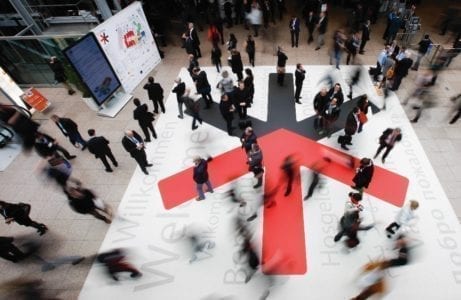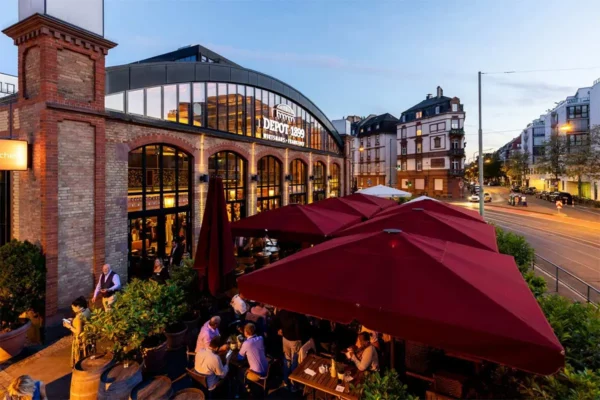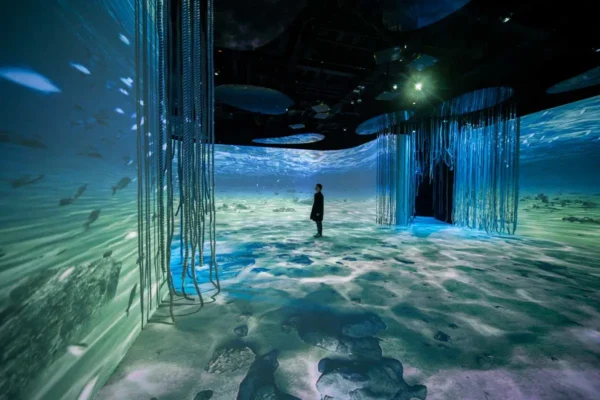 EuroShop Evolves into World’s Premiere Exhibition Industry Event for Designers
EuroShop Evolves into World’s Premiere Exhibition Industry Event for Designers
Launched 50 years ago as a diminutive trade fair for retail store designers, EuroShop this year rolls out an entire tract aimed at exhibit designers, including two dedicated show halls, 270 booths, and daily learning events for exhibition industry professionals.
Acknowledging that the line between retail display design and exhibition display design has been significantly blurred in recent years, organizers of EuroShop have continued to broaden the event’s market by making more strides than ever this year to provide programming that specifically serves designers coming for trade show-related content. That content will include two show halls filled with exhibition-specific businesses as well as daily sessions and a new daily Expo and Event Forum that will focus on current issues surrounding expos and events.
The triannual event, being held in Dusseldorf, Germany, from March 5-9, is expected to include more than 2,200 exhibitors from 56 countries in 1.2 million square feet of show floor space. In 2014 the event brought in 109,000 visitors, two-thirds of whom came from abroad. While it is still branded as the world’s No. 1 retail trade fair, its scope has morphed over time to include everything about the buying experience, including at the exhibition level.
EuroShop began in 1966 as the European Exhibition and Congress “Moderne Läden und Schaufenster” (Modern Stores and Shop Windows) – and it was formed to address the changing needs of shop owners who were looking for innovative ways to design stores to include the self-service trend that was emerging in places like grocery stores and pharmacies. Held in Dusseldorf since its inception, the event spent its early days attracting primarily designers for retail store and window displays, though it evolved over time to incorporate more facets of the retail operation including advertising, lighting, and technology.
But by 2002, EuroShop had seen a strong influx of interest in the exhibition side of the design industry, so it incorporated a segment specifically for expos. Today that segment is labeled Exhibition Architecture, Design, and Events, and it is being organized in collaboration with FAMAB (Association for Direct Business Communication) and IFES (International Federation of Exhibition and Event Services) and it includes veins like staging, live communications, event design, and more. According to organizers, the new Expo and Event Forum, which will be organized by FAMAB, IFES, the Studieninstitut für Kommunikation (Institute for studies of communication) and the trade magazine m+a report, will cover industry-specific topics such as “Exhibition Stands in the Context of Contemporary Design Trends”, “Gamification”, “Brand Spaces – Experience-Driven Brand Management”, “Sustainable Solutions for the Industry“, “New Materials”, “Corporate Architecture” and “Brave New World: How Virtual Reality changes the Exhibitionscape,” and all lectures will be interpreted simultaneously in English and German.
There are seven distinct subdivisions within EuroShop’s 17 show halls: POP Marketing, Expo & Event Marketing, Retail Technology, Lighting, Visual Merchandising, Shop Fitting & Store Design and Food Tech & Energy Management. Organizers note, however, that the borders between segments of retail and exhibition concepts are increasingly difficult to distinguish as retail design, exhibition architecture, communication design, events planning, and marketing all significantly overlap each other today when it comes to innovation and best practices.
That continued blurring as well as EuroShop organizers’ ongoing effort to better serve each segment of its market has created the world’s most important event for designers among the exhibition and retail industries. In addition to its strong draw for the triannual EuroShop exhibition in Dusseldorf, the event has spawned smaller offshoots including C-star, Shanghai’s International Trade Fair for Solutions and Trends all about Retail, and Forum EuroCIS, an annual event that brings more than 400 information technology companies from 29 countries together with 10,500 visitors. According to organizers, EuroShop is just hitting its stride as a global event and the segmented structure of it allows flexibility for future development. “With its 50 years, EuroShop is by no means in a midlife crisis,” organizers say. “Quite the contrary: it is an experienced, cosmopolitan ‘grand dame’ with a family of offspring, who succeeds in rejuvenating itself and thrilling the world time and again.”
For more info on Euroshop, visit http://www.euroshop-tradefair.com/.





























